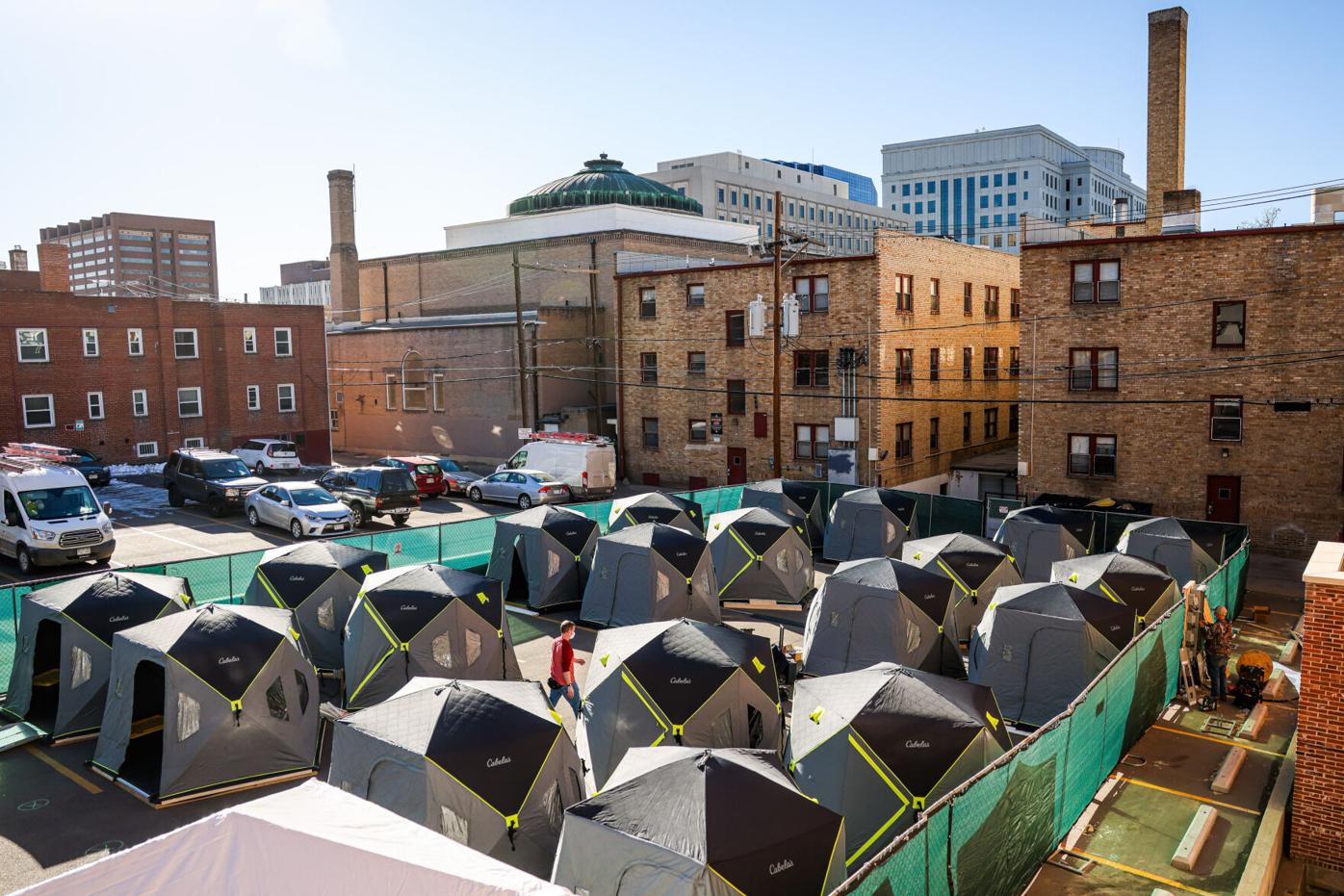Denver advances $3.9 million to expand managed homeless camps

Tents sit in the parking lot at First Baptist Church in Denver’s Capitol Hill neighborhood on Friday, Dec. 4, 2020. The tents, part of Denver’s first Safe Outdoor Space, housed up to 30 women and trans-identifying individuals through June 2021 . (Michael Ciaglo/Special to The Denver Gazette)
Michael Ciaglo/Special to The Denver Gazette
The Denver City Council will soon vote on a $3.9 million contract to fund the expansion of managed homeless camps after the housing committee unanimously advanced the contract Wednesday.
If passed by the full council, the contract would fund at least four camps in the city through the end of 2022, run by the Colorado Village Collaborative. The organization now runs three camps, called Safe Outdoor Spaces, in the parking lots of the Human Services East Office, Regis University and Denver Health.
Denver began its managed homeless camp program in late 2020 as the COVID-19 pandemic increased unsheltered homelessness and raised public health concerns about indoor congregate shelters. There have been six managed camps throughout the city so far.
“Safe Outdoor Spaces emerged for us as an important element of our pandemic response,” said Angie Nelson, director of the Denver Department of Housing Stability. “We know these structures aren’t housing, and we know the solution to homelessness is housing, but we also have a big gap in the affordable housing available to meet the needs of everyone experiencing homelessness in our city.”
The camps are fenced off and staffed 24/7, providing residents with heated tents, bathrooms, laundry services, internet, food, dental care, COVID-19 testing and services for finding permanent housing.
New report gives insight into the pandemic's impact on homelessness in Denver
In 2020, two camps sheltered a total of 65 people. By 2021, three camps sheltered 242 people and helped transition 47 of them into more stable housing. In 2022, the $3.9 million in funding would shelter 310 households throughout the year, totaling roughly 370 people, Nelson said.
Of the camp occupants in 2022, Colorado Village Collaborative aims to connect at least 30% of those leaving to more stable housing, said Cole Chandler, executive director of the organization.
While the contract was advanced unanimously, Councilwoman Amanda Sawyer raised concerns about managed homeless camps. Sawyer, who has voted against funding the camps in the past, said traditional indoor shelters are a better investment for the city.
“I’m just not 100% convinced that this is something that the city should be investing in,” Sawyer said. “If private investors and private locations are interested in pursuing (the camps), then that makes sense.”
Though traditional shelters may be more cost effective per person, they don’t provide the stability of the managed camps and have barriers for people who don’t want to be separated from their partners or pets, Councilwoman Robin Kniech said.
Aurora mayor to reintroduce proposed homeless camping ban
“We cannot only look at cost per night per person,” Kniech said. “If our goal is saving money, that may work. If our goal is to not have unsheltered homelessness and to serve everybody with different (needs), then we will need a variety of models. … We have to be practical about filling gaps.”
Chandler said 98% of the residents of the managed camps were previously living unsheltered like in illegal camps on the street, not in the city’s homeless shelters. Chandler also said the stay length of camp residents has ranged from 30 days to 14 months.
If approved, the $3.9 million contract would raise the total project funding to just under $4.8 million. The $3.9 million would come from COVID-19 recovery funds from the American Rescue Plan Act. The City Council already approved the spending plan, including the managed homeless camps, in November.
The full council will vote on the contract in the coming weeks.
On Wednesday, the housing committee also advanced contracts that would allocate $1.025 million to U.S. Motels Denver North for overflow homeless shelters, $1.7 million to Elevation Community Land Trust for income-restricted homeownership units and $3.732 million to Colorado Village Collaborative for the Denver Street Outreach Collaborative and Strategic Outreach to Large Encampments programs.
Denver's homeless employment program extended through end of year




